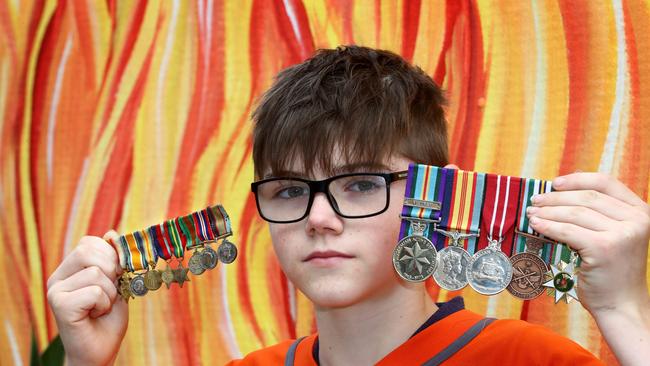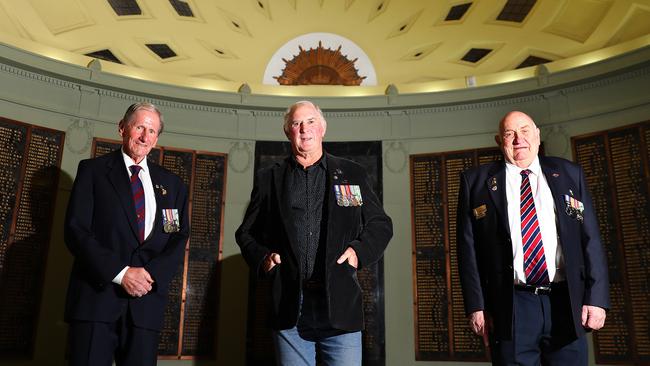‘The spirit of Anzac:’ How mateship has helped Geelong’s veterans heal from the pain
Geelong’s Vietnam veterans recall the abuse they suffered upon their return from war but the comfort they now draw from Anzac Day commemorations.
Geelong
Don't miss out on the headlines from Geelong. Followed categories will be added to My News.
DAVID Wilson was barely out of his teens when he enlisted in the Australian Army through National Service.
Mr Wilson was only 20 when he served in the 5RAR as a machine gunner from 1969-70, but said he came back feeling a decade older.
“You grew up very quickly,” he said.
“You came home as a 21-year-old, but you were probably more like a 30- year-old.
“You don’t have the same fears that other people have.”
Mr Wilson said while his “non-army mates” feared death and pain, “warries” tended to “accept it”.
“There were bad times, but there were a lot of good times of camaraderie,” he said.
“We had our different times – things weren’t so good when you were out in the bush and you had contacts (with the enemy).”
The now-grandfather said that, like most Vietnam veterans, he struggled to talk about his time in the army, but had developed a lifelong bond with fellow ex-servicemen.
Mr Wilson said the ostracism faced by Vietnam veterans left such a lasting impact that he had very little to do with the RSL until about five years ago. Now, he is a leader at the Geelong TPI veteran support group.
“We got abused and spat at,” he said.
“We weren’t accepted into society, even the RSL rejected us.”
Now, Mr Wilson finds solace in the support group where he helps facilitate art classes and dabbles in watercolour painting. His wife of 53 years, Sandra, is also involved.
Mr Wilson was only 21 when he returned from the war and worked multiple jobs before starting his own business.
“I got married 10 days after returning (from Vietnam),” he said. “I say it’s an arranged marriage – Sandra arranged it.”
The couple have two children and five grandchildren.
While Anzac Day provides Mr Wilson opportunity to reflect on his service, he will also think of his relatives.
His grandfather served in three wars, his uncle was a bomber pilot and his father worked with aircraft.
“I’ve got a history of veterans in the family (and) I suppose I like to keep the mind in touch with the family,” he said.

EDDY Newton might have been a doctor, but instead he enlisted as a field medic in the 12th Regiment of the Royal Australian Artillery.
At only 18, the horror Mr Newton witnessed meant he had “had enough” and abandoned his medical career when he returned home.
“My call sign was Starlight, if they needed me that was the message,” he said.
“(Attending to) their needs medically that was my job.”
Like Mr Wilson, Mr Newton struggles to speak about his time at war.
“We don’t talk much about our experiences of Vietnam,” he said.
“When I came back, like all the others, we were ostracised.
“We didn’t say anything, we didn’t admit to being veterans.”
So tense was the political climate that Mr Newton said his return home was secretive.
“I came in by plane, got dropped off at Sydney at night,” he said.
“We had to wear black pants, white shirt and no uniform so we weren’t recognised.
“We had to find our own way back to Melbourne.
“It wasn’t a good time.
“We were abused, of course, in all different areas and accused of things.”
Mr Newton said being maligned, coupled with the horrors of war, led him to develop PTSD. He said the impact was still felt “right through until today”.

“I was a regular soldier, I worked with a lot of national servicemen. I was lucky enough to be in Melbourne to help process people and I’ve seen the same people (before and after war) and they were different people,” he said.
Mr Newton said much of the war was fought at night, leaving many returned soldiers unable to sleep.
“They were wide awake at 2am ... it was a different life,” he said.
He is now vice-president of the Geelong TPI and said the recognition Vietnam veterans now received had helped enormously.
“The veterans are a very close group and it’s actually part of the spirit of Anzac (that) we look after ourselves,” he said.
“We are mates, it all comes under that heading.”
This Anzac Day would be particularly important, given commemorations had been scaled down in 2020 and 2021 due to Covid, he said.
“It’s a very solemn day and it’s quite an emotional day for all of us,” Mr Newton said.
“It’s been growing in the community and the support to our veterans is huge.
“We are seeing it now in our children throughout the people of Geelong.”
More Coverage
Originally published as ‘The spirit of Anzac:’ How mateship has helped Geelong’s veterans heal from the pain





